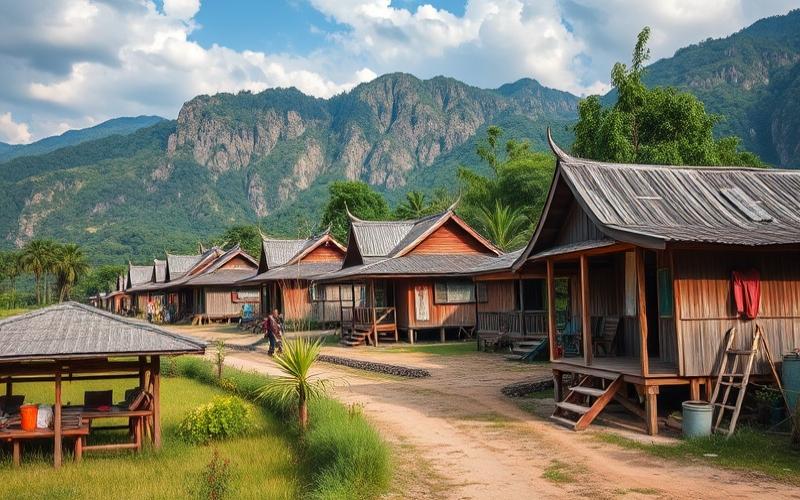
 Published on and written by Cyril Jarnias
Published on and written by Cyril Jarnias
Acquiring Agricultural Land in Thailand
Acquiring agricultural land in Thailand may seem like an attractive opportunity for investors and agriculture enthusiasts, but it requires a thorough understanding of the country’s complex legal system.
Thai laws impose strict restrictions on land ownership by foreigners, making the purchasing process potentially complicated. However, several solutions exist to navigate these legal obstacles.
Available Options for Foreigners
- Long-term leases
- Partnerships with Thai nationals
- Establishing local companies
Legal Guide
This legal guide provides you with a detailed overview of the various steps and considerations needed to navigate Thai land law, so you can successfully complete your project with confidence.
Good to Know:
It is essential to consult with a lawyer specializing in Thai land law before committing to any agricultural land purchase.
Overview of the Legal Framework for Purchasing Agricultural Land in Thailand
Legal Framework for Agricultural Land Acquisition in Thailand
Thai law, particularly the Land Code and Agricultural Land Act, prohibits foreigners from direct ownership of agricultural land, regardless of its use. This prohibition aims to preserve the national land heritage. Legal titles (Chanote, Nor Sor 3) are issued exclusively to Thai citizens or entities where the majority of capital is held by Thais.
Investment Options for Foreigners:
- Long-term lease:
Foreigners can obtain land use rights through leases of up to 30 years, renewable. This mechanism does not confer ownership but allows for agricultural or residential use. - Thai company:
Foreign investors can indirectly hold agricultural land by creating a company where Thais own at least 51% of the share capital. - Limited exceptions:
In highly regulated cases, a foreigner may acquire up to 1 rai (1600 m²) for residential use if they invest at least 40 million baht in the national economy. This possibility remains marginal and rarely used in the agricultural sector.
| Access Method | Direct Ownership | Long-term Lease | Majority Local Company |
|---|---|---|---|
| Foreigner | No | Yes | Yes |
| Thai | Yes | Yes | Yes |
Procedure and Main Land Documents:
- Pre-emption Certificate (Nor Sor 2): provisional occupancy authorization.
- Certificate of Use (Nor Sor 3): certifies effective development according to contract.
- Chanote Title Deed: definitive title conferring full ownership, reserved for Thai citizens or majority local companies.
Involved Government Agencies:
- Department of Lands
- Ministry of Agriculture
- Local Cadastral Office
These agencies oversee the issuance of land titles, verify transfers, and monitor compliance with legal conditions during acquisitions or leases.
Recent Reforms & Legislative Trends:
Discussions have taken place regarding a potential partial opening to foreign ownership to attract more international investment. However, no significant reforms have been adopted to date; the legal framework remains very restrictive on this point. Periodic adjustments mainly concern administrative procedures and often strengthen control over mixed corporate structures involving foreign capital.
Key Points to Remember:
- Direct agricultural ownership is reserved for nationals.
- Foreign investment primarily occurs through leases or locally controlled Thai companies.
Good to Know:
In Thailand, ownership of agricultural land by foreigners is subject to strict restrictions under the Thai Land Code, prohibiting direct acquisition of land by non-citizens; however, solutions such as long-term leases, often 30 years renewable, or partnerships with Thai citizens can be considered to bypass these limitations. Foreign investors can also create limited companies where they hold up to 49% of shares, although these structures require compliance with various regulations. The Land Department is the government agency responsible for overseeing and registering land transactions. Recent reforms aim to facilitate foreign investment while protecting local resources, which could potentially influence existing legislation and offer new opportunities. Recent examples show growing interest in strategic joint ventures, allowing shared exploitation of agricultural resources while respecting national laws.
Risks and Precautions When Purchasing Non-Buildable Land
Legal and Regulatory Restrictions
- Non-buildable land is subject to strict restrictions under Thai urban planning law (B.E. 2518) which defines zoning: agricultural, conservation, recreational, industrial, etc.
- Only certain zones permit construction. Others, particularly agricultural or conservation areas, prohibit any real estate development.
- Foreigners generally cannot own land outright. Legal solutions include long-term leases, creating a local company, or highly regulated exceptions.
- Property titles (Chanote, Nor Sor 3, etc.) must be verified to understand the exact rights attached to the land.
Associated Financial Risks
- High risk of land depreciation if illegal constructions are carried out or if the land status is unfavorably modified.
- Inability to obtain a building permit, limiting land appreciation and resale.
- Potential for significant financial penalties for non-compliance with local laws.
- Risk of disputes with authorities or third parties, making the land difficult to use or sell.
Environmental and Conservation Implications
- Many non-buildable lands are classified as conservation or protected areas (light green zones, agricultural zones, etc.).
- Any violation of environmental legislation (deforestation, unauthorized construction, land modification) exposes one to fines, demolition of structures, or even criminal prosecution.
- Restrictions may evolve, strengthening environmental preservation requirements.
Verifying Land Classification Before Purchase
- Consult the official Thai Land Department website to verify zoning, property title, and specific restrictions.
- Strongly recommended to engage:
- A lawyer specializing in Thai real estate law.
- A local surveyor to verify boundaries and the actual land situation.
- An experienced real estate agent in the relevant region.
- Inspection of legal documents, search for disputes, validation of the absence of encumbrances or mortgages on the land.
Risk Mitigation Strategies
- Prefer long-term lease agreements (leasehold) to secure usage without aiming for full ownership.
- Establish partnerships with trusted local owners to benefit from their knowledge of the legal and social context.
- Use local companies (under strict conditions) to hold the land, while respecting Thai law.
- Include specific clauses in purchase or lease contracts to protect against zoning changes or disputes.
- Engage a notary or lawyer to draft and secure all legal documents.
| Main Risks | Recommended Precautions |
|---|---|
| Legal restrictions for foreigners | Long-term lease, local company, legal advice |
| Depreciation due to construction | Thorough verification of zoning and permits |
| Environmental sanctions | Strict compliance with conservation status |
| Disputes or encumbrances on land | Due diligence, notarial verification |
Before any acquisition, thorough preliminary checks with local experts are essential to secure the investment and avoid any unpleasant surprises.
- Key Takeaway:
Never commit without validating the legal status, zoning, and environmental restrictions of the land, and without specialized support.
Good to Know:
In Thailand, purchasing non-buildable land is subject to strict legal restrictions, including land use laws that limit exploitation and property rights for foreigners, often restricted to long-term leases. Financial risks are high, as a careless acquisition can lead to depreciation, especially if illegal constructions are carried out, exposing the buyer to fines or the obligation to demolish illegal structures. Furthermore, land may be subject to rigorous environmental regulations, and non-compliance can result in severe penalties. Before purchase, it is crucial to verify the land classification with local authorities and consult a lawyer specializing in Thai real estate law to avoid mistakes. Strategies such as partnerships with local owners or shared competency agreements can offer better investment protection while respecting local legislation.
Understanding Rural Zoning in Thailand and Its Legal Implications
Categories of Rural Zoning in Thailand and Impact on Agricultural Land Acquisition
Rural zoning in Thailand is based on a color-coded system and categories defining permitted uses for each land parcel. The main categories of rural and agricultural zoning are as follows:
| Color / Category | Primary Use |
|---|---|
| Green (Rural Agricultural Zone) | Agriculture, livestock, light agro-processing |
| White with green diagonal | Agricultural and rural conservation |
| Olive | Rural educational institutions |
| Yellow | Low-density residential |
| Others (gray, blue, etc.) | Specific zones: religious, government, etc. |
Forest areas are also subdivided:
| Forest Category | Description |
|---|---|
| Zone C (Conserved Forest) | Strict protection, agricultural use prohibited |
| Zone E (Commercial Forest) | Controlled forestry exploitation |
| Zone A (Permitted Agriculture) | Agriculture allowed, sometimes under conditions |
Local Land Use Regulations and Restrictions for Foreigners
- Land use is regulated by the Town and City Planning Act and provincial or municipal zoning plans.
- In green zones, the primary use is agricultural: only certain constructions (farms, agricultural structures, residences associated with the operation) are permitted. Residential or industrial constructions are restricted.
- Foreigners cannot directly own agricultural land; however, they can lease land for a maximum duration (typically 30 years, renewable) or invest through companies (under strict conditions on capital composition and governance).
- In some cases, Special Economic Zones (SEZ) may allow limited exceptions to attract investment, but these derogations are controlled and regulated.
Administrative Procedures to Verify Zoning Status
- Request a zoning certificate from the local Land Office.
- Consult official zoning plans, available from the municipal or provincial administration.
- Verify correspondence between the land title (Chanote or other) and the zoning plan.
- Engage a local specialized lawyer for interpretation of applicable regulations and restrictions.
Legal Risks Associated with Investment in a Specific Zone
- Non-compliant acquisition or use: unauthorized construction or land use contrary to zoning can lead to administrative sanctions (fines, demolition, permit revocation).
- Retroactive zoning changes: a modification of the zoning plan can render previous uses non-compliant, exposing the acquirer to legal risks or inability to continue certain activities.
- Risks of expropriation or usage limitations if classified as conservation or reforestation zones.
Examples of Zoning Modifications and Impact on Land Ownership
- Transition from green zone to residential zone: possibility of increased urbanization, rise in land value, but necessity to comply with new construction rules.
- Reclassification as conservation zone: prohibition of any agricultural activity or additional construction, obligation for ecological restoration, potential decrease in land value.
Legal Implications of Non-Compliance
- Administrative fines and demolition orders for unauthorized constructions or uses.
- Blocking of property transfer procedures or refusal of registration.
- Risk of disputes with authorities or legal actions for non-compliance with local regulations.
Mitigation Strategies for Agricultural Land Buyers
- Conduct thorough due diligence including: verification of zoning status, examination of land title, research on history of zoning modifications.
- Engage a local lawyer specializing in land law to secure the transaction.
- Include contingency clauses in the purchase contract, making acquisition conditional on the absence of major legal risks.
- Prefer land with clear titles located in stable agricultural zones, or benefiting from long-term planning.
- Anticipate possible local zoning evolutions (infrastructure projects, urban extensions, etc.) by consulting competent authorities and urban development plans.
Important:
Any land transaction must undergo thorough administrative verification and legal accompaniment to prevent risks related to zoning and ensure investment compliance with Thai legislation.
Good to Know:
In Thailand, the complexity of rural zoning can significantly influence the purchase of agricultural land, divided into categories such as those for agriculture, conservation, or light industry, each with its own land use regulations. Local laws impose rigorous restrictions on foreign investors, often requiring them to create specific legal entities to purchase land, while non-compliance with zoning regulations can lead to property confiscation or high fines. Potential buyers must mandatorily verify zoning status with the Land Office to avoid disputes, given that zoning modifications, such as transitioning from agricultural to industrial, can radically change land value and use. To mitigate risks, it is advisable to work with specialized lawyers and consider acquiring land under authorized legal structures, while staying informed about zoning updates to anticipate potential legal constraints.
Disclaimer: The information provided on this website is for informational purposes only and does not constitute financial, legal, or professional advice. We encourage you to consult qualified experts before making any investment, real estate, or expatriation decisions. Although we strive to maintain up-to-date and accurate information, we do not guarantee the completeness, accuracy, or timeliness of the proposed content. As investment and expatriation involve risks, we disclaim any liability for potential losses or damages arising from the use of this site. Your use of this site confirms your acceptance of these terms and your understanding of the associated risks.



















































